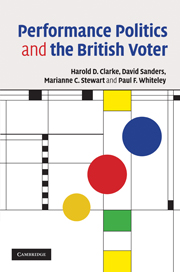Book contents
- Frontmatter
- Contents
- List of figures
- List of tables
- Acknowledgments
- 1 Performance politics and the British voter
- 2 The theory of valence politics
- 3 Valence politics and the long campaign
- 4 Tony's war
- 5 Electoral choices
- 6 The short campaign
- 7 Voting and political participation
- 8 Performance, people and the political system
- 9 Performance politics reconsidered
- Appendix A Vote in 2005 by socio-demographic characteristics
- Appendix B Turnout by socio-demographic characteristics
- Appendix C Dynamics of party identification
- Notes
- Bibliography
- Index
9 - Performance politics reconsidered
Published online by Cambridge University Press: 06 January 2010
- Frontmatter
- Contents
- List of figures
- List of tables
- Acknowledgments
- 1 Performance politics and the British voter
- 2 The theory of valence politics
- 3 Valence politics and the long campaign
- 4 Tony's war
- 5 Electoral choices
- 6 The short campaign
- 7 Voting and political participation
- 8 Performance, people and the political system
- 9 Performance politics reconsidered
- Appendix A Vote in 2005 by socio-demographic characteristics
- Appendix B Turnout by socio-demographic characteristics
- Appendix C Dynamics of party identification
- Notes
- Bibliography
- Index
Summary
The story of this book is a story of performance politics. What counts most — not exclusively — when voters make their choices are judgments about how well the competing political parties and their leaders perform on issues that matter. These typically are what Donald Stokes (1963, 1992) called ‘valence issues’. As discussed in earlier chapters, valence issues are ones upon which there is strong agreement. The quintessential example is the economy — virtually everybody wants a buoyant economy characterized by vigorous, sustainable growth, coupled with low rates of inflation and unemployment. But, economic well–being is not all. Healthcare, education and other public services are also important. In Britain and other mature democracies, effective delivery of these public services long has been a key aspect of performance politics. Judgments about party performance on valence issues have multiple sources, but they are not simply reflections of what people read in the newspaper and see on television. Personal experience counts as well.
In recent years, the traditional valence issue agenda that defined the battleground of party competition since the end of the Second World War has been transformed to include concerns about crime, immigration and terrorism. Although overwhelming majorities always have been opposed to criminal and terrorist activities, opinion about immigration has followed a different course. Historically, although some people have been opposed to an expansive immigration policy, others have looked favourably on it, arguing that large–scale immigration fuels economic growth and is consistent with principles of diversity and tolerance that are central tenets of a democratic political culture.
- Type
- Chapter
- Information
- Performance Politics and the British Voter , pp. 306 - 320Publisher: Cambridge University PressPrint publication year: 2009



